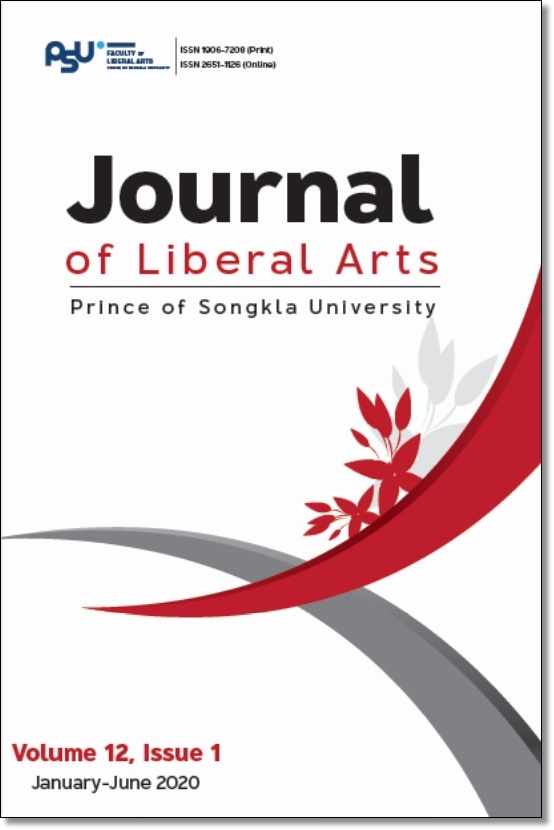The Culture Management of the Second-tier Provinces to Support Local Experience-Based Tourism under the LINK Project
Keywords:
culture management, local experience, tourismAbstract
This qualitative research aims to study cultural management to support local experiences of second-tier provinces under The LINK Project of Tourism Authority of Thailand (TAT). Focus groups and in-depth interviews were applied to gain data from leaders of local communities, local scholars, villagers, entrepreneurs, administrators in relation to cultural management of 10 provinces. The results revealed that 1) cultural managers are multidisciplinary profession groups in the communities, local entrepreneurs and local people and outsider entrepreneurs; 2) Local experience activities include walking around, overnight in homestay, making handicrafts, cooking local food and dessert and visiting historical places; 3) Cultural knowledge are collected through inheritance within family, learning from generation to generation, observation and self-study; 4) Tangible cultures are transferred through lectures, demonstration, workshops, tasting food and self-study; 5) Intangible cultures are transferred through storytelling of beliefs related to history, religions, wisdom and local soul; 6) Cultures are maintained through local people participation, cultivation of local people’s pride in their local culture and raising their awareness of local culture preservation, co-working among local people of all ages for cultural transfer; 7) Problems and challenges in culture management are that culture managers lack knowledge and understanding of local experience tourism and tourist behaviors. They are unable to communicate in English and they do not customize their cultural interpretation according to types of tourists; and 8) Guidelines for culture management include co-working with private or local tourist guides for English translation, improving interpretation skills of culture managers and design suitable interpretation methods for different types of tourists.
References
Chainok, P. (2010). Alternative: Guidelines for the development of culture tourism-a case study of Ban Dansal Dansai District Loei Province [Unpublished master’s thesis]. Loei Rajabhat University. [in Thai]
Chaipiboon, S. (2007). Cultural tourism management. A case study of tourism potential of Nakornchum Community, Amphoe Muang, Kamphaeng Phet Province. Kamphaeng Phet Rajabhat University. [in Thai]
Chaiyachen, J., Unaromlert, T. and Paiwithayasiritham, C. (2017). The application of social capital development model to promote creative tourism industry of Klong Roi Sai. Veridian E-Journal, Silpakorn University, 10(2), 2039-2055. [in Thai]
Chongsuanaoy, M. (2009). Hotel’s public relations strategy for cultural tourism management [Unpublished master’s thesis]. Chulalongkorn University, Bangkok. [in Thai]
Chusit, W. (2008). Enculturation of ancestral spirit worship of Mon (Raman): case study of Mon Ban-Khongkhanuea Community Moo 3, Khlong Ta Khot Sub-district, Photharam District, Ratchaburi Province. [Unpublished master’s thesis]. Thammasat University, Bangkok. [in Thai]
Dumrikol, S. (2016). Arts and culture management. Chiang Mai University: interdisciplinary of Arts and Culture Management, Graduate School. [in Thai]
Eamlaorpakdee, P. (2005). Experiential marketing: Customer experience. University of the Thai Chamber of Commerce Journal, 25(2), 19-28. [in Thai]
Eawsriwong, N. (2014). Asean loincloth, Sinhs, underwear and etc. (2nd ed.). Mathichon Publishing. [in Thai]
Jayawan, W. (2006). Status of Environment and Culture influenced on promoting cultural tourism: A case study of Pom Mahakan Community, Bangkok. [Unpublished master’s thesis]. Mahidol University, Nakhon Pathom. [in Thai]
Jittangwattana, B. (2013). Tourism industry. (2nd ed.). Thammasat University Book Store. [in Thai]
Kaewhawong, T. (2005). Society strengthening process, community, civil society. (8th ed.). Klungnana Vitthaya Press. [in Thai]
Kaewthep, K. (1995). Development approaches for communities’ culture. Caritas Thailand. [in Thai]
Kaewthep, K. (2014). Story of communication. Parbpim Design & Printing. [in Thai]
Keyuraphan, L., Bookoum, W., & Narin, S. (2016). A development model of Thai Phuan Community’s tourism activity management to promote creative learning in Nakhon Nayok. Veridian E-Journal, Silpakorn University, 9(2), 2190-2201. [in Thai]
Kongsawad, J. (2007). A study of promoting approach for cultural tourism. a case study of Authong Ancient City, Suphanburi Province [Unpublished master’s thesis]. Silpakorn University, Nakhon Pathom. [in Thai]
Piamdontree, A. (2014). The use of literature Khunchang Khunphaen for promoting cultural tourism in Suphanburi Province [Unpublished master’s thesis]. Chulalongkorn University, Bangkok. [in Thai]
Pongpis, S. (2007). Thinking method, method: Economic plan of community. (5th ed.). Charoenvit Publishing. [in Thai]
Punkaew, P. (2014). Expectation and satisfaction of Thai tourists towards cultural tourism: A case study of tourist tram managed by Municipality Office of Nan [Unpublished master’s thesis]. Chulalongkorn University, Bangkok. [in Thai]
Sakunapat, P. (2003). Folk culture and Thai tradition. Wisdom Publishing. [in Thai]
Singharungrueng, P. (2010). A study of cultural recreation activity of Phu Thai Tribe for promoting tourism. Chulalongkorn University, Bangkok. [in Thai]
Wanlayangkul, P. (2003). Thai arts and culture. PNK Publishing. [in Thai]
Downloads
Published
How to Cite
Issue
Section
License
The authors retain the copyright to their article but the Journal of Liberal Arts, Prince of Songkla University reserves the exclusive rights to first publication.






